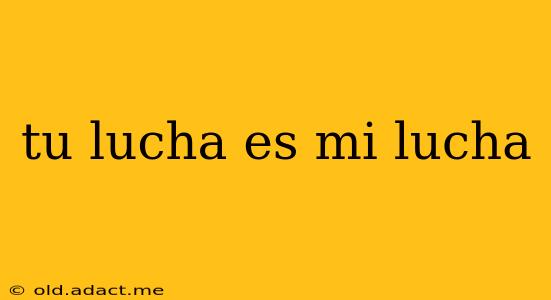Tu Lucha Es Mi Lucha: A Deeper Dive into Solidarity and Shared Struggle
The phrase "Tu Lucha Es Mi Lucha" – "Your struggle is my struggle" – resonates deeply, encapsulating a powerful message of solidarity and shared experience. It transcends language and cultural barriers, speaking to the fundamental human connection forged through adversity and the shared pursuit of justice. But what does this phrase truly mean, and how does it manifest in the real world? This exploration delves into the meaning, historical context, and contemporary relevance of this powerful statement.
What Does "Tu Lucha Es Mi Lucha" Mean?
At its core, "Tu Lucha Es Mi Lucha" represents a commitment to collective action and mutual support. It signifies a recognition that individual struggles are often interconnected, part of a larger systemic issue impacting entire communities or groups. When someone declares "Tu Lucha Es Mi Lucha," they are not merely expressing sympathy; they are actively aligning themselves with the cause, pledging their support and resources to fight alongside the oppressed. This isn't just about empathy; it's about active allyship.
What is the Historical Context of "Tu Lucha Es Mi Lucha"?
While the exact origin is difficult to pinpoint, the sentiment behind "Tu Lucha Es Mi Lucha" has deep historical roots in various social justice movements. The phrase echoes similar expressions of solidarity found throughout history: the labor movement's emphasis on collective bargaining, the civil rights movement's calls for racial equality, and feminist movements advocating for gender equality all share this fundamental principle of shared struggle. The phrase's popularity has been further amplified by its association with various contemporary social justice movements.
How is "Tu Lucha Es Mi Lucha" Used Today?
Today, "Tu Lucha Es Mi Lucha" serves as a rallying cry for numerous movements fighting for social justice. It's used in contexts ranging from the fight against systemic racism and police brutality to LGBTQ+ rights and environmental activism. The phrase transcends specific issues, acting as a unifying principle highlighting the interconnectedness of various struggles for equality and human rights. Its usage underlines the belief that progress requires collective action and that the fight for justice is not a solo effort.
What are some examples of "Tu Lucha Es Mi Lucha" in action?
Numerous examples showcase the power of this phrase in action. For instance, the Black Lives Matter movement has demonstrated how solidarity across various marginalized communities amplifies the fight for racial justice. Allies from diverse backgrounds utilizing this ethos actively participate in protests, donate to relevant causes, and advocate for policy changes to support the struggle against systemic racism. Similarly, environmental activists use this sentiment to foster collaborations between different organizations and communities fighting for environmental protection, recognizing that environmental degradation affects everyone.
What does "Tu Lucha Es Mi Lucha" mean in terms of allyship?
The phrase represents a crucial element of effective allyship. It signifies a commitment to not just listening and understanding, but actively participating in the fight for justice. Allyship requires acknowledging that the fight against oppression is not a burden to be carried solely by those experiencing it, but a shared responsibility. It's about actively amplifying marginalized voices and using one's own privilege and resources to support the struggle.
Conclusion: The Enduring Power of Solidarity
"Tu Lucha Es Mi Lucha" is more than just a slogan; it’s a powerful statement of solidarity and a call to action. It reminds us that our struggles are often intertwined and that true progress necessitates collective effort. By embracing this ethos, we can foster a more just and equitable world where everyone's fight for a better future is recognized and supported. The enduring power of this simple phrase lies in its ability to foster a sense of community, unity, and shared purpose in the ongoing pursuit of justice and equality.
